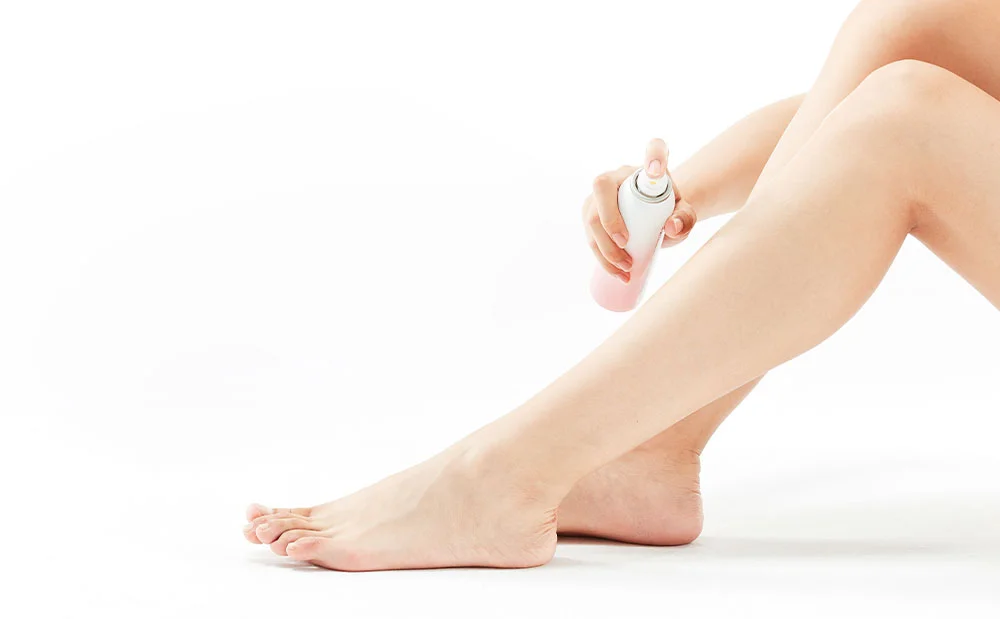
We’ve all heard of magnesium supplements that supposedly promote better sleep, but what about sleepy time foot spray?
As odd as it sounds, many TikTokers have claimed that magnesium foot spray has helped them get the best ZZZs.
According to one TikToker (@larloo22), the spray has helped her and her kids sleep better.
“I love how it helps me sleep better. It helps me with muscle recovery. I even put it on my kids’ feet before they go to bed at night,” she said in recent video.
Another user commented, “I’ve never slept like this. GET IT!!!”
But can you really believe every sleep hack that you find on TikTok?
When it comes to sleepy foot spray, you should be skeptical, according to sleep experts.
So before you go spraying your feet, let’s take a closer look at the potential connection between magnesium and sleep.
Magnesium and Sleep
Some research suggests that magnesium can help promote better sleep by helping our bodies relax before bedtime. (1)
“Magnesium supplements may help you sleep by promoting muscle relaxation, regulating your nervous system, and potentially lowering cortisol levels. These create a more conducive environment for better sleep,” according to Dr. Raj Dasgupta, Sleepopolis’ Chief Medical Advisor.
While magnesium does not directly help you sleep better according to experts, the mineral’s properties can help your body relax, which might make it easier for you to fall asleep at bedtime.
However, not all magnesium sources are created equal. Different types of supplements can have different effects.
So what type of magnesium should we take if we want to fall asleep more easily?
Experts Weigh In: Is Magnesium Spray Effective?
Magnesium supplements are most commonly taken as a pill, gummy, or powder. But as the demand for sleep supplements grows (along with our sleep problems…), so does the variety of magnesium options on the market.
Nowadays you can easily find magnesium foot sprays, bath salts, lotions, and even hot chocolate mix.
But are they effective?
Sleepopolis’s Director of Sleep Health, Dr. Shelby Harris, warns against such products.
“Melatonin and magnesium are being added to so many things like hot chocolate and body sprays and lotions, yet the data behind them is still quite lacking and inconsistent,” said Dr. Harris.
Even though the research behind magnesium sprays is limited, why are some claiming that magnesium foot spray helps them sleep better?
“The pores on our feet are said to be the largest pores on our body, and some believe that spraying on the feet aids in getting the mineral into our blood system and lymphatics more directly/quickly,” Lauri Leadley, sleep expert and founder of Valley Sleep Center, tells Sleepopolis.
While this logic might make sense at first, there’s very limited research to suggest that spraying magnesium on your feet has any real sleep benefits
“There isn’t much evidence that spraying on the feet is more effective than an oral supplement. Given the information we have, it seems like nothing more than just another social media trend,” said Leadley.
Okay, so it looks like TikTok missed the mark on this sleep hack.
Don’t fret just yet, there are other magnesium alternatives that experts say are more effective at helping us fall asleep.
Better Alternatives to Magnesium Spray
If you’re looking to try magnesium supplements for better sleep, you might want to start with a traditional oral supplement like a gummy, pill, or powder, according to Dr. Raj Dasgupta, Chief Medical Advisor for Sleepopolis.
As always, it’s best to consult with your doctor before taking any supplements.
But it’s important to note that we can also increase our intake of magnesium through our diet instead of supplements.
“However, the best form of magnesium is from our diet. Eating a well-balanced diet including foods that contain magnesium such as spinach, avocados, and eggs will have the greatest effect on your overall health and wellbeing,” says Dr Raj.
As much as I wish that a magic sleepy spray really worked, it looks like we’re going to have to turn to other (less trendy) methods to help us sleep better.
Sources
- Zhang Y, Chen C, Lu L, et al. Association of magnesium intake with sleep duration and sleep quality: findings from the CARDIA study. Sleep. 2021;45(4):zsab276. doi:https://doi.org/10.1093/sleep/zsab276
Leadley, Lauri. Personal Interview. June 26, 2024.


























